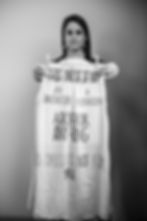



Airing Out the “Dirty” Laundry is an ongoing community art movement that responds to the silencing of women*,
creating opportunities for all women to share experiences through visual storytelling.
*Airing Out the “Dirty” Laundry holds space for all women across the intersections of race, age, color, ability, faith, religion, ancestry, national origin, citizenship, social class, economic class, ethnicity, sexual orientation, gender identity and gender expression.

Add your story to the Laundry Line.
Use the guide to create a piece from home and place it in the mail to become a part of the ongoing collection.
Correct the voice in your head that says your story is not important to share.

Individuals, groups and communities of people are invited to engage in Airing Out the “Dirty” Laundry in multiple ways.
Virtual and in-person Laundry Days are a call for women* to gather together, opportunity to listen and to be heard, and to foster the love and understanding that resists hate and injustice. Laundry Day Workshops provide basic art making materials and brave, supportive, and safe spaces for all to create pieces of visual storytelling.
Women’s signed or anonymous stories are collected and then joined together on laundry clotheslines in ongoing installations. Each story has a top layer that flows freely and is meant to be lifted as an invitation to the viewer to engage in and reveal the story underneath.
Individuals are also invited to participate virtually in MESSAGE RECEIVED and by creating a visual or audio storytelling piece from home.
All of the stories and experiences that are shared become a part of the ongoing collection.
*All women, femmes, and non binary people who are comfortable in a space that centers the experiences of women are invited to participate.

 Time TBDVirtual and in-person optionsTime TBDVirtual and in-person options
Time TBDVirtual and in-person optionsTime TBDVirtual and in-person options
 Sat, Oct 21BaltimoreOct 21, 2023, 12:00 PM – 2:00 PMBaltimore, 1400 Greenmount Ave, Baltimore, MD 21202, USA
Sat, Oct 21BaltimoreOct 21, 2023, 12:00 PM – 2:00 PMBaltimore, 1400 Greenmount Ave, Baltimore, MD 21202, USA
 Sun, Aug 07ZoomAug 07, 2022, 12:00 PM – 1:00 PMZoom
Sun, Aug 07ZoomAug 07, 2022, 12:00 PM – 1:00 PMZoom
 Multiple DatesSun, Jun 26ZoomJun 26, 2022, 12:00 PM – 1:00 PMZoom
Multiple DatesSun, Jun 26ZoomJun 26, 2022, 12:00 PM – 1:00 PMZoom
 Thu, Oct 29DiGiorgio Campus CenterOct 29, 2020, 7:00 PM – 9:00 PMDiGiorgio Campus Center, 2020 Alumni Dr, Rock Hill, SC 29733, USAOct 29, 2020, 7:00 PM – 9:00 PMDiGiorgio Campus Center, 2020 Alumni Dr, Rock Hill, SC 29733, USAThe Winthrop University Galleries and Andrea are working in partnership to create this in-person Laundry Day Workshop opportunity. ALL women from the Rock Hill and Winthrop University communities are invited to participate.
Thu, Oct 29DiGiorgio Campus CenterOct 29, 2020, 7:00 PM – 9:00 PMDiGiorgio Campus Center, 2020 Alumni Dr, Rock Hill, SC 29733, USAOct 29, 2020, 7:00 PM – 9:00 PMDiGiorgio Campus Center, 2020 Alumni Dr, Rock Hill, SC 29733, USAThe Winthrop University Galleries and Andrea are working in partnership to create this in-person Laundry Day Workshop opportunity. ALL women from the Rock Hill and Winthrop University communities are invited to participate.
 Thu, Oct 226 pm (EST)Oct 22, 2020, 6:00 PM – 7:15 PM6 pm (EST)
Thu, Oct 226 pm (EST)Oct 22, 2020, 6:00 PM – 7:15 PM6 pm (EST)
 Tue, Oct 20ZoomOct 20, 2020, 6:00 PM – 7:00 PMZoom
Tue, Oct 20ZoomOct 20, 2020, 6:00 PM – 7:00 PMZoom
 Mon, Oct 12DiGiorgio Campus CenterOct 12, 2020, 12:00 PM – Nov 20, 2020, 5:00 PMDiGiorgio Campus Center, 2020 Alumni Dr, Rock Hill, SC 29733, USA
Mon, Oct 12DiGiorgio Campus CenterOct 12, 2020, 12:00 PM – Nov 20, 2020, 5:00 PMDiGiorgio Campus Center, 2020 Alumni Dr, Rock Hill, SC 29733, USA
 Sat, Sep 26Center for the ArtsSep 26, 2020, 12:00 PM – Oct 25, 2020, 5:00 PMCenter for the Arts, 121 E Main St, Rock Hill, SC 29730, USA
Sat, Sep 26Center for the ArtsSep 26, 2020, 12:00 PM – Oct 25, 2020, 5:00 PMCenter for the Arts, 121 E Main St, Rock Hill, SC 29730, USA
 Fri, Sep 25Mint Museum UPTOWNSep 25, 2020, 11:00 AM – Nov 29, 2020, 5:00 PMMint Museum UPTOWN, 500 S Tryon St, Charlotte, NC 28202, USA
Fri, Sep 25Mint Museum UPTOWNSep 25, 2020, 11:00 AM – Nov 29, 2020, 5:00 PMMint Museum UPTOWN, 500 S Tryon St, Charlotte, NC 28202, USA
 Sat, Sep 19Facebook LIVESep 19, 2020, 11:00 AM – 12:00 PMFacebook LIVE
Sat, Sep 19Facebook LIVESep 19, 2020, 11:00 AM – 12:00 PMFacebook LIVE
 Sat, Sep 19ZoomSep 19, 2020, 11:00 AM – 12:00 PMZoom
Sat, Sep 19ZoomSep 19, 2020, 11:00 AM – 12:00 PMZoom
 Sat, Aug 22Facebook LIVEAug 22, 2020, 12:00 PM – 1:00 PMFacebook LIVE
Sat, Aug 22Facebook LIVEAug 22, 2020, 12:00 PM – 1:00 PMFacebook LIVE
 Sat, Aug 22ZoomAug 22, 2020, 11:00 AM – 12:00 PMZoom
Sat, Aug 22ZoomAug 22, 2020, 11:00 AM – 12:00 PMZoom
 Sun, Aug 02ZoomAug 02, 2020, 4:00 PM – 4:45 PMZoom
Sun, Aug 02ZoomAug 02, 2020, 4:00 PM – 4:45 PMZoom
 Sun, Jul 19ZoomJul 19, 2020, 2:00 PM – 3:00 PMZoom
Sun, Jul 19ZoomJul 19, 2020, 2:00 PM – 3:00 PMZoom
 Sat, Jun 27ZoomJun 27, 2020, 11:00 AM – 12:00 PMZoom
Sat, Jun 27ZoomJun 27, 2020, 11:00 AM – 12:00 PMZoom





COMMUNITY
PARTNERS

Working collaboratively and in partnership with organizations is incredibly important and directly reflects the purpose and mission of Airing Out the “Dirty” Laundry--to hold space for all women across the intersections of race, age, color, disability, faith, religion, ancestry, national origin, citizenship, social class, economic class, ethnicity, sexual
orientation, gender identity and gender expression.








